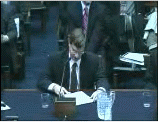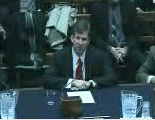"Where's that porn coming from, son?"
Spammers cause ever new embarassments. This week-end, we were visiting my parents. Thanks to Apple's excellent OS X, they are reasonably comfortable with their computer (well, mostly) which mostly serves as a repository for digital photography, and for exchanging e-mail and instant messages with me. Fortunately, their e-mail addresses haven't made it onto any spammers' lists, yet. You can probably imagine my surprise when I was suddenly questioned about some porn they had recently found in their inbox. The solution: This wasn't porn addressed to them, but a bounce message. Some spammer had, apparently, guessed my father's e-mail address (<first name>@does-not-exist.org; the first name isn't that rare), and had been using it as the sender's address for obscene spam. That spam hadn't reached the intended recipient, though, but my parents. No, I'm not suggesting that "adult content", "obscenity", or whatever you want to call it be banned online. But I don't want to be asked by my parents where that porn in their inbox comes from, either.
In more pleasant news on the spam front, Wired reports that Dutch police have arrested 52 people suspected of being involved with Nigerian scam schemes.
 Besides the usual "whois is important" statements, Rick Wesson testified about his fraudit system, and pointed out that registrars have no business incentives to verify contact data supplied to them as long as they are paid. He seemed to suggest that additional lelgislation was needed in order to create such incentives. (I may have mis-heared him on that point, though.)
Besides the usual "whois is important" statements, Rick Wesson testified about his fraudit system, and pointed out that registrars have no business incentives to verify contact data supplied to them as long as they are paid. He seemed to suggest that additional lelgislation was needed in order to create such incentives. (I may have mis-heared him on that point, though.) J Scott Evans repeatedly said that ICANN efforts on WHOIS accuracy were busy discussing procedure, not substance. I wonder how he came to that conclusion -- Task Force 3 is, after all, chaired by a member of the IPC, and (I'm hearing) currently attempting to reach out and collect input on available accuracy verification mechanisms. Outreach seems stalled, though, because relevant contact information is lacking.
J Scott Evans repeatedly said that ICANN efforts on WHOIS accuracy were busy discussing procedure, not substance. I wonder how he came to that conclusion -- Task Force 3 is, after all, chaired by a member of the IPC, and (I'm hearing) currently attempting to reach out and collect input on available accuracy verification mechanisms. Outreach seems stalled, though, because relevant contact information is lacking. First, as an all-time favorite, most corkscrews. The classical
First, as an all-time favorite, most corkscrews. The classical  Second, a recently-discovered stupidity, Samsonite's
Second, a recently-discovered stupidity, Samsonite's  Third, the keyboard in my trusty Dell laptop. A critical part of the mechanism is a relatively thin piece of tin that must be bent in the right way -- and, of course, is distorted over time, with all kinds of not so funny effects on my typing habits. The distortion effect is particularly strong with the shift and control keys, but can fortunately be fixed with a little bit of tinkering. The stupid assumption, though, that tin doesn't exhibit unelastic distortions, seems to have been commonplace in Dell hardware design for quite some time. I still remember some "workstations" which provided comfortable access to the PCI bus, but required re-bending some critical tin parts after the third exchange of a faulty PCI card.
Third, the keyboard in my trusty Dell laptop. A critical part of the mechanism is a relatively thin piece of tin that must be bent in the right way -- and, of course, is distorted over time, with all kinds of not so funny effects on my typing habits. The distortion effect is particularly strong with the shift and control keys, but can fortunately be fixed with a little bit of tinkering. The stupid assumption, though, that tin doesn't exhibit unelastic distortions, seems to have been commonplace in Dell hardware design for quite some time. I still remember some "workstations" which provided comfortable access to the PCI bus, but required re-bending some critical tin parts after the third exchange of a faulty PCI card.
